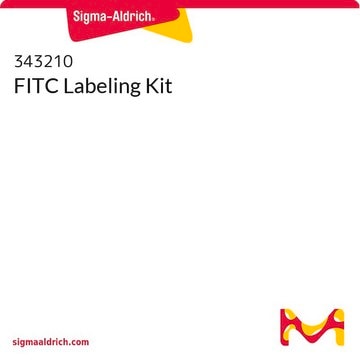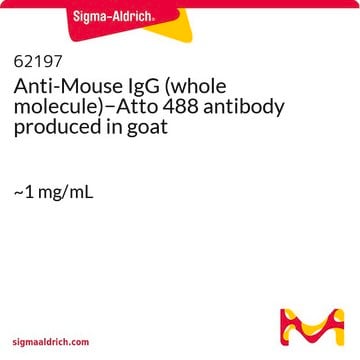38371
Atto 488 Protein Labeling Kit
BioReagent, suitable for fluorescence
Sign Into View Organizational & Contract Pricing
All Photos(1)
About This Item
UNSPSC Code:
12352200
NACRES:
NA.32
Recommended Products
product line
BioReagent
manufacturer/tradename
ATTO-TEC GmbH
fluorescence
λex 488 nm; λem 520 nm in 0.1 M phosphate buffer, pH 7.0 (recommended)
suitability
suitable for fluorescence
storage temp.
2-8°C
Looking for similar products? Visit Product Comparison Guide
Related Categories
General description
This kit contains sufficient amounts of reactive dye, buffers and protein purification sets for performing five labeling reactions (1 mg protein each) and for the subsequent purification of the labeled protein.
Application
Atto fluorescent labels are designed for high sensitivity applications, including single molecule detection. Atto labels have rigid structures that do not show any cis-trans-isomerization. Thus these labels display exceptional intensity with minimal spectral shift on conjugation. Atto 488 Protein Labeling Kit is used to produce Atto 488 labeled proteins via conjugation to primary amine groups.
Legal Information
This product is for Research use only. In case of intended commercialization, please contact the IP-holder (ATTO-TEC GmbH, Germany) for licensing.
Storage Class Code
10 - Combustible liquids
WGK
WGK 3
Flash Point(F)
Not applicable
Flash Point(C)
Not applicable
Certificates of Analysis (COA)
Search for Certificates of Analysis (COA) by entering the products Lot/Batch Number. Lot and Batch Numbers can be found on a product’s label following the words ‘Lot’ or ‘Batch’.
Already Own This Product?
Find documentation for the products that you have recently purchased in the Document Library.
Customers Also Viewed
Sheng Shu et al.
Nature communications, 13(1), 4576-4576 (2022-08-06)
Lipopolysaccharide (LPS) is an essential glycolipid and forms a protective permeability barrier for most Gram-negative bacteria. In E. coli, LPS levels are under feedback control, achieved by FtsH-mediated degradation of LpxC, which catalyzes the first committed step in LPS synthesis.
Gražvydas Lukinavičius et al.
Current opinion in chemical biology, 15(6), 768-774 (2011-11-15)
Numerous synthetic fluorophores have been developed that can switch their spectroscopic properties upon interaction with other molecules or by irradiation with light. In recent years, protein-labeling techniques have been introduced that permit the specific attachment of such molecules to proteins
Andrea Pallares Pallares et al.
Food & function, 9(12), 6544-6554 (2018-11-28)
The presence of cell walls entrapping starch granules in common bean cotyledons, prevailing after thermal processing and mechanical disintegration, has been identified as the main reason for their (s)low in vitro starch digestibility. Nevertheless, it is unknown if the role
Daniela C Dieterich
Current opinion in neurobiology, 20(5), 623-630 (2010-07-24)
Fluorescent proteins have revolutionized cell biology and, therefore, our understanding of the complex molecular and cellular mechanisms that wire the brain together and enable its plasticity throughout life. The ability to visualize cell biological processes has inspired the development of
Switching modulation for protein labeling with activatable fluorescent probes.
Kalyan K Sadhu et al.
Chembiochem : a European journal of chemical biology, 12(9), 1299-1308 (2011-06-02)
Our team of scientists has experience in all areas of research including Life Science, Material Science, Chemical Synthesis, Chromatography, Analytical and many others.
Contact Technical Service





